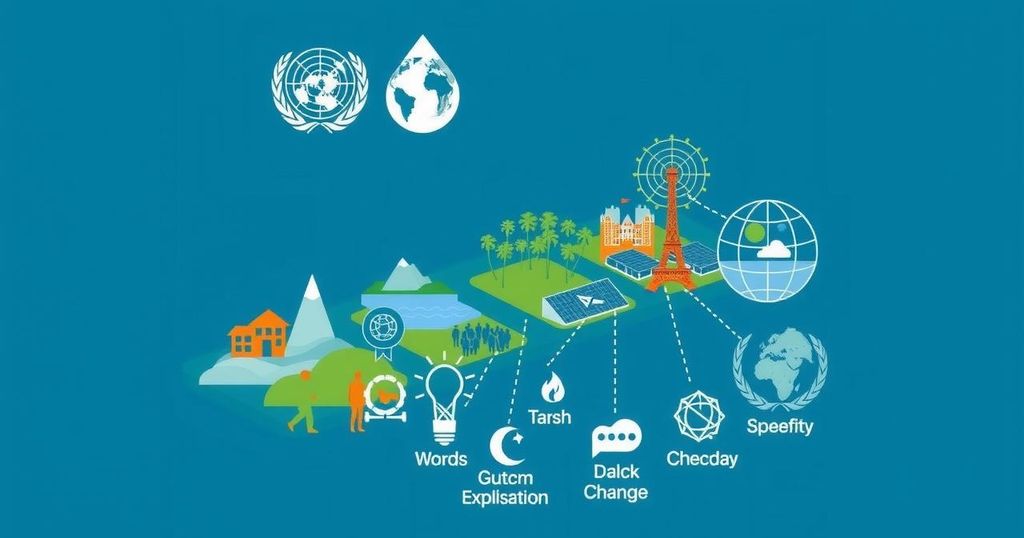Climate change
ASIA, AZERBAIJAN, CLIMATE CHANGE, CLIMATE RESILIENCE, EUROPE, INTERNATIONAL COOPERATION, JO, JODI - ANN JUE XUAN WANG, LISA VAHALA, MARK MASLIN, OXFORD, PACIFIC, PACIFIC OCEAN, PARIS AGREEMENT, PRI, PRITI PARIKH, SIMON CHIN - YEE, SUSTAINABLE DEVELOPMENT, UCL, UN, UNITED KINGDOM, UNIVERSITY OF, UNIVERSITY OF OXFORD
Fatima Khan
0 Comments
Assessing the Fundamental Flaws of UN Climate Change Summits and COP29
COP29 raised concerns about the UN climate process, with projections indicating global warming could exceed 3˚C. Support for vulnerable countries fell short, and the lack of clarity on “climate finance” complicates funding efforts. The summit’s weak regulations on carbon trading and continued fossil fuel dependency elicited widespread criticism. Experts call for stronger mechanisms and equitable financing to effectively address the climate crisis.
The recent COP29 climate summit in Azerbaijan has ignited serious concerns regarding the efficacy of the United Nations’ approach to addressing global warming. Climate experts Mark Maslin, Priti Parikh, and Simon Chin-Yee express skepticism about optimistic projections, warning of potential temperature rises surpassing 3˚C. The summit concluded with an ambitious commitment to triple funding to vulnerable nations by 2035, yet critics argue that the proposed $300 billion annual support falls significantly short of developing countries’ demands, which were predominantly aimed at receiving unrestricted grants rather than loans.
The complexity of climate financing is compounded by a lack of consensus on what constitutes “climate finance,” leading wealthy nations to advocate for a mix of grants, loans, and insurance. The involvement of the private sector in funding initiatives, with a projected goal of generating $1.3 trillion by 2035, raises additional concerns. Experts warn that the private sector may prioritize immediate profits over essential climate initiatives, particularly regarding compensation for existing climate damages.
Delegates from developing countries at COP29 challenged the perpetuated narrative of debt dependency on wealthier nations. Research highlights that countries most vulnerable to climate change contribute a mere 4% of global emissions while incurring losses of $525 billion from climate impacts between 2000 and 2019. Economists underline that developed nations are indeed in debt to developing nations, suggesting that initiatives must enforce the “polluter pays” principle to ensure equitable financial responsibilities in climate action.
Azerbaijan hosted COP29 despite its deep ties to the fossil fuel industry, complicating discussions surrounding the urgent need to address fossil fuel dependency. The failure to implement a clear action plan on fossil fuels, despite earlier commitments to phase them out, reveals persistent resistance from major oil-producing nations. Scholars express concern that without decisive action to discontinue fossil fuel subsidies, emissions will continue to escalate.
After years of debate, COP29 finally reached an agreement on carbon trading rules, but skepticism remains regarding their effectiveness and the potential for misuse. Experts warn about the dangers of weak regulations, which may allow corporations to continue polluting without substantive accountability. Such regulations lack proper vetting mechanisms, potentially creating loopholes that undermine climate targets.
SThis entire COP process has been deemed “fundamentally flawed” by scholars and analysts alike, although it still represents a critical platform for international dialogue on climate policy. Suggestions for improvement include more frequent regional dialogues and immediate actions by the largest greenhouse gas emitters. As the urgency of climate issues grows amidst increasingly severe impacts, the global community must refocus efforts to develop actionable, equitable solutions.
The United Nations Framework Convention on Climate Change (UNFCCC) serves as the framework for international negotiations aimed at combating climate change. However, recent summits, particularly COP29 held in Azerbaijan, have drawn criticism for failing to adequately address the needs of vulnerable nations and the systemic issues inherent in climate finance. The complexities of funding, poor adherence to commitments regarding fossil fuels, and weak carbon trading regulations continue to obstruct meaningful progress. Understanding these dynamics is crucial for assessing the effectiveness of global climate actions and the potential for future negotiations to yield substantial results.
In conclusion, COP29 has highlighted critical flaws within the UN climate negotiation framework, particularly regarding financing, action on fossil fuels, and regulatory efficiency in carbon markets. The commitment of wealthy nations to provide financial support remains inadequate, and the accountability mechanisms for emissions reductions are severely lacking. As the climate crisis escalates, the urgency for robust, equitable solutions becomes more critical. Governments and stakeholders must explore innovative financing strategies and enforce stringent regulations to foster a sustainable future.
Original Source: www.downtoearth.org.in




Post Comment